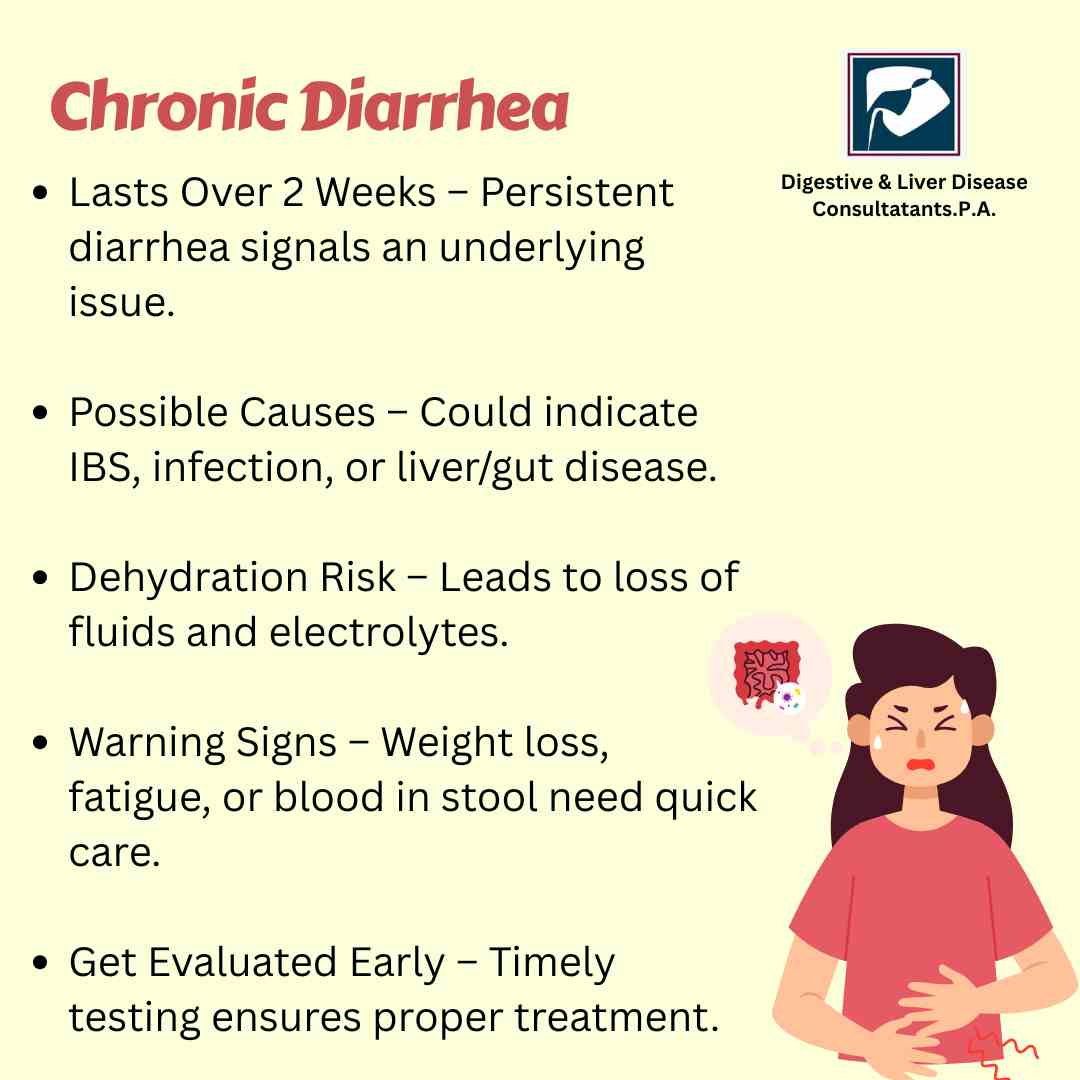Everyone experiences diarrhea once in a while, usually due to a stomach infection or something they ate. But when it lasts for weeks instead of days, it’s not just an inconvenience—it’s a sign that something more serious may be going on with your digestive system.
Chronic diarrhea can affect your nutrition, energy levels, and overall quality of life. It can also be a symptom of an underlying medical condition that needs proper diagnosis and treatment. Let’s talk about what causes it, when to worry, and how specialists can help you get lasting relief.
What Is Chronic Diarrhea?
Chronic diarrhea is defined as having loose or watery stools that persist for more than four weeks. Unlike acute diarrhea, which usually clears up in a few days, chronic diarrhea signals a deeper problem affecting digestion or nutrient absorption.
It can happen several times a day and may be accompanied by bloating, cramping, nausea, or even weight loss. Over time, it can also lead to dehydration, weakness, and nutritional deficiencies.
Common Causes of Chronic Diarrhea
There are many possible reasons behind chronic diarrhea, ranging from mild conditions to serious digestive diseases.

1. Irritable Bowel Syndrome (IBS)
IBS is one of the most common causes of ongoing diarrhea. In IBS-D (diarrhea-predominant IBS), the intestines contract irregularly, causing frequent loose stools, abdominal pain, and urgency after meals.
2. Inflammatory Bowel Disease (IBD)
Conditions like Crohn’s disease and ulcerative colitis cause chronic inflammation in the digestive tract, leading to diarrhea mixed with blood or mucus, along with fatigue and abdominal pain. IBD can also cause long-term complications if not properly managed.
3. Celiac Disease
Celiac disease is an autoimmune condition where eating gluten (found in wheat, barley, and rye) damages the small intestine. This interferes with nutrient absorption, leading to chronic diarrhea, bloating, and weight loss.
4. Lactose Intolerance
If your body lacks the enzyme lactase, it can’t properly digest lactose, the sugar found in milk and dairy products. The result? Gas, bloating, and watery stools shortly after consuming dairy.
5. Chronic Infections
Certain bacterial, viral, or parasitic infections can linger in the intestines, especially after travel or exposure to contaminated food or water. These infections can cause prolonged diarrhea until properly treated.
6. Malabsorption Disorders
When your digestive system can’t absorb nutrients effectively, diarrhea often follows. Conditions like pancreatic insufficiency, where the pancreas doesn’t produce enough digestive enzymes, can lead to oily, foul-smelling stools.
7. Medications
Long-term use of certain medications—such as antibiotics, magnesium-containing antacids, or chemotherapy drugs—can upset your gut and cause diarrhea.
8. Thyroid Disorders
An overactive thyroid (hyperthyroidism) speeds up metabolism and bowel movements, sometimes leading to persistent diarrhea.
9. Colon Cancer or Polyps
In rare cases, changes in bowel habits like chronic diarrhea could indicate colon cancer, especially if accompanied by blood in stool, unexplained weight loss, or fatigue.
When Should You See a Doctor?
Occasional diarrhea isn’t a big concern, but if it continues beyond a few days or is associated with other symptoms, it’s time to seek medical help.
- See a gastroenterologist if you experience:
- Diarrhea lasting more than 2–3 weeks
- Blood or mucus in your stool
- Severe abdominal pain or cramping
- Unintentional weight loss
- Dehydration (dry mouth, dizziness, reduced urination)
- Fever or fatigue that doesn’t improve
Persistent diarrhea can lead to electrolyte imbalance, malnutrition, and dehydration, all of which can affect your heart, kidneys, and overall health.
How Is Chronic Diarrhea Diagnosed?
Your doctor will start by reviewing your medical history and symptoms. To pinpoint the cause, you may need:
- Stool tests to check for infections or inflammation
- Blood tests to detect celiac disease, thyroid issues, or nutritional deficiencies
- Colonoscopy or endoscopy to examine the digestive tract
- Imaging tests to identify structural or inflammatory problems
- Food allergy or intolerance testing to detect sensitivities
Accurate diagnosis is the first step toward relief.
Treatment Options for Chronic Diarrhea
Treatment depends on the underlying cause, but some general approaches include:
1. Dietary Changes
- Avoid trigger foods such as dairy, caffeine, alcohol, and spicy or fatty foods.
- Follow a low-FODMAP diet if you have IBS.
- Stay hydrated with electrolyte-rich fluids.
2. Medications
- Antidiarrheal drugs like loperamide may provide short-term relief.
- Antibiotics if an infection is the cause.
- Anti-inflammatory drugs or immune suppressants for IBD.
- Enzyme supplements for pancreatic insufficiency or lactose intolerance.
3. Probiotics
Adding probiotics (healthy gut bacteria) can help restore balance in your digestive system, especially after antibiotic use.
4. Managing Stress
Stress can worsen digestive issues, especially IBS. Relaxation techniques like deep breathing, yoga, or meditation can help calm your gut-brain connection.
Long-Term Complications of Untreated Chronic Diarrhea
Ignoring chronic diarrhea can lead to:
- Severe dehydration
- Malnutrition and vitamin deficiencies
- Weight loss and fatigue
- Worsening of underlying diseases like IBD or celiac disease
That’s why identifying and treating the cause early is essential.
Expert Digestive Care You Can Trust
At Digestive & Liver Disease Consultants, P.A., our experienced gastroenterologists in Houston, Texas, specialize in diagnosing and treating chronic digestive problems like persistent diarrhea, IBS, IBD, and celiac disease.
We use advanced diagnostic tools, including endoscopy, colonoscopy, and specialized lab tests, to pinpoint the cause of your symptoms and provide a personalized treatment plan. Our goal is to help you restore your gut health and regain confidence in your daily life.
Conclusion
Chronic diarrhea is more than just an inconvenience—it’s your body’s way of signaling that something isn’t right. While temporary stomach bugs come and go, ongoing symptoms deserve medical attention.
With the right diagnosis and treatment, most people can find relief and prevent long-term complications.
If you’ve been dealing with persistent diarrhea or digestive discomfort, don’t wait any longer. Schedule an appointment with the experts at Digestive & Liver Disease Consultants, P.A. for accurate testing, expert care, and lasting relief.






